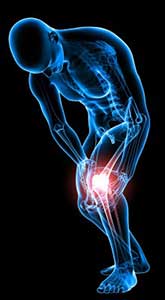Knee Pain: The Facts
One of the most common reasons people visit the doctor is because of knee pain, be it as a result of a sports injury, overuse or medical conditions like arthritis, infection or gout
Some Possible Causes
- Arthritis – including rheumatoid arthritis, osteoarthritis and gout

- Baker’s cysts – fluid-filled swellings behind the knee that might occur as a result of other medical conditions
- Bursitis – inflammation caused by the repeated application of pressure to the knee
- Kneecap dislocation
- Knee injuries
- Torn cartilage
- Torn ligament
When Do I See A Doctor About Knee Pain?
According to NHS guidelines you should see your GP in the following situations:
- If you can’t put weight on your knee at all
- If you have severe pain, even when not putting weight on the knee
- If your knee locks or painful clicks
- If your knee looks deformed
- If you have fever, redness or heat around the knee
- If your knee is very swollen
- If you have pain, swelling, numbness or tingling of the calf beneath the affected knee
- If the pain is still severe after three days of caring for your knee at home
Risk Factors
- Being overweight
- Repetitive high-impact activity (e.g. jogging, skiing)
- A lack of muscle strength or flexibility
- Age
- Biomechanics (e.g. one leg being shorter than the other, flat feet)
Treatment Options
Short-term
- Painkillers (e.g. paracetamol or ibuprofen) and combined painkillers (e.g. paracodamol, co-codamol or co-dydramol)
- Transcutaneous electrical nerve stimulation (TENS). TENS delivers a low-voltage electrical current through the skin, scrambling the pain signals travelling to the spinal cord and brain with few to no associated side effects (more...)
Important!
Do not use a tens machine if you have epilepsy, certain types of heart disease (see your doctor if uncertain), use a pacemaker, or pregnant
Long-term
- Surgical intervention – usually keyhole surgery, though other surgical options are available depending on the root cause of the knee pain
- Traditional physiotherapy – exercise regimes prescribed by doctors, these need to be kept up to continue being effective
- Non-traditional physiotherapy – AposTherapy is a non-traditional physiotherapy treatment comprising two convex pods fitted to the bottom of your shoe. These pods work to adjust the foot’s point of contact with the ground, redistributing the forces on the painful knee and realigning the body – allowing you to reduce your pain while walking around as normal. The treatment can even be combined with other long-term options, as discussed in a great two-part feature on AposTherapy’s company blog here
Questions To Expect When Going To See The Doctor
- When did your knee first start hurting?
- Have you had knee pain before? If so, what was the cause in that instance?
- Does your knee hurt right now, or is the pain off and on?
- Is it one knee or both knees that hurt?
- Were you able to walk here yourself or did you need assistance?
- Can you feel pain in the whole knee or is it in one specific area of the knee?
- Do you have any other symptoms along with the knee pain?
Knee Pain Prevention
- Losing excess weight and keeping it off
- Maintaining a good level of strength and flexibility (more info here...)
- Spending 5 to 10 minutes warming up before exercises, and then 5 to 10 minutes stretching to cool down after exercise
- Wearing appropriate footwear that fits you well and gives you the appropriate support for the activity you’re doing
This article was written by Jonathan Edge
Jonathan Edge is a freelance writer based in the UK. Knee pain is something that members of his family have suffered from for a number of years and, as such, he has researched this topic thoroughly. It was this endless trawl of contradictory information that finally lead him to compile everything he’d found into an easy-to-follow document (as above)
Some Comments…
Julie and I agree this page offers a lot of useful information and sound advice and this is well put together (many thanks, Jonathan!)
As a runner, you might be sitting there looking a little worried by now, wondering if running can harm your knees – well you can stop worrying! Yes, knee pains are common for runners, especially beginners, but usually this is a temporary symptom and the pain fades
Looking at the research which has been done there’s nothing to suggest running causes any permanent or long term damage to the knee – in fact the opposite is true

Research shows that running is beneficial to the knee. One of these studies carried out by Boston University of Medicine showed that running stimulated the cartilage in a certain way which repairs damage, increasing the production of certain proteins which adds strength to the knee (of course, there are exceptions, for example, after a serious knee injury or surgery)
Although running may not be the initial cause of knee problems it can aggravate existing ones (e.g. misalignment, bursitis) . So it goes without saying if you have persistent pain from the knee then seek professional medical advice
You may also want to take a look at your training…
Knee pain can be a symptom of poor running form, an overuse injury (too much, too soon?), lack of strength training, injury prevention or, simply, it could be the shoes you wear. Personally I had success switching to minimalist shoes but be careful, the transition has to be gradual (more here…)
OK there you have it. Feel free to have a look at the research/articles below. Very interesting ;-)
Put Those Shoes On: Running Won't Kill Your Knees (npr.org)
Why Runners Don’t Get Knee Arthritis (nytimes.com)
Effects of running and walking on osteoarthritis and hip replacement risk (Pub-Med.gov)
Why don't most runners get knee osteoarthritis? A case for per-unit-distance loads (Pub-Med.gov)
To return from the knee pain page back to the Home Page, <<<< click here >>>>
